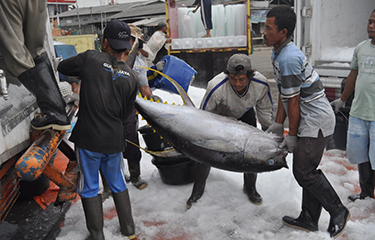The 25th Session of the Indian Ocean Tuna Commission begins Monday, 7 June, and several stakeholders are demanding immediate action from the regional fisheries management organization to put an end to overfishing of yellowfin tuna in the region.
Several non-governmental organizations issued statements in advance of the meeting, saying the IOTC can no longer ignore its responsibility of putting in place an agreement that will save the tuna stock, which has been deemed to be overfished.
Glen Holmes, an officer with The Pew Charitable Trusts’ international fisheries project who leads the organization’s engagement with three of the world’s five regional fisheries management organizations overseeing tuna fishing, including the IOTC, said the RFMO “has allowed overfishing to continue, despite yellowfin being overfished since 2015 and the IOTC’s adoption of its first rebuilding plan for the stock in 2016."
Holmes said despite mounting pressure, the IOTC "concluded last year’s annual meeting and its special session in March without agreement on a revised rebuilding plan, leaving yellowfin on the path to further depletion.”
The IOTC’s 2021 annual meeting, scheduled to take place through 11 June, is a crucial meeting for the commission, he said, in which it must reach “consensus to immediately end overfishing and advance long-term, science-based management procedures that would not only recover the stock but prevent overfishing in the future."
The Indian Ocean yellowfin tuna fishery is valued at USD 4.19 billion (EUR 3.4 billion) and rebuilding the stocks is key to ensuring that markets and communities that depend on the tuna stocks will not be severely affected, Holmes said.
A joint statement issued by several other NGOs – including the WWF, the Oliver Ridley Project, the International Pole and Line Foundation, Blue Marine Foundation, WildAid, Blue Resources Trust, The Maldives Resilient Reefs Project, Shark Project, Blue Venture Beyond Conservation, Transparency, Maldives A Coalition For Integrity, BillFish Foundation, and Maldives Fishermen – urged the IOTC to adopt a conservation and management measure to rebuild the yellowfin tuna stock using the best scientific advice available, and set catch limits in the range of 339,000 to 350,000 metric tons.
The groups warned that if no action is taken at the current meeting, the ocean's yellowfin tuna stocks could collapse within the next five years.
“NGOs are concerned about the current state of this yellowfin tuna stock, since a rebuilding plan put in place by the IOTC in 2016 to significantly reduce catches, based on 2014 catch levels, has proved ineffective,” their statement said.
According to new catch figures, catches have actually increased by over 10 percent between 2014 and 2019, they said.
Some seafood and food companies are also urging the IOTC to adopt tighter catch limits. Luciano Pirovano, the global sustainable development director of the food business unit of Bolton Group – a major producer of several brands of tuna and the owner of tuna supplier Tri Marine – announced his company will only source yellowfin tuna caught in the Indian Ocean "exclusively from vessels whose flag state commits to implement the catch limits decided at the next IOTC meeting in June 2021.”
“As a market leader, we feel it is our duty to be the first to concretely change our practices, to set a good example for all players in the sector to follow,” Pirovano said.
Bolton Food said it will not source from IOTC CPC vessels whose flag state is, or will be, 100 percent exempted from any catch reduction.
The company added it will make “a progressive and significant reduction in its use of yellowfin tuna caught in the Indian Ocean, reaching a reduction of at least 20 percent in 2024 compared to its average supply in the period 2017-2019.”
“Therefore, we are committed to buy tuna from stocks that are healthy and support fishing activities that minimize their environmental impacts,” Pirovano said. “This means rethinking our sourcing when necessary and demanding stronger regulations on fisheries management to allow for tuna stock rebuilding and recovery, such as in the case of the Indian Ocean. All our efforts are projected into the future, our desire is to give future generations a healthy ocean and a world where sustainability is the norm, not just a trend."
Photo courtesy of Wibowo Djatmiko







